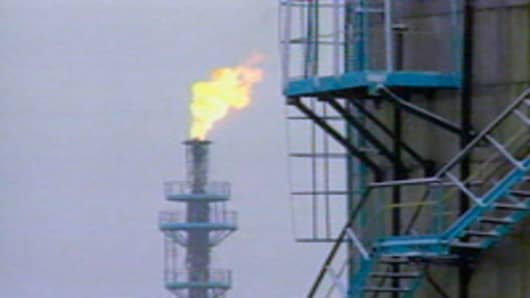Oil edged downward, after surging to a record high above $90 per barrel earlier on Friday, as tight fuel stocks ahead of winter and a softening U.S. dollar spurred investor buying.
Oil prices has been driven upward by an unprecedented weakness in the dollar, which fell to another record low against the euro on Friday -- a factor that has supported all dollar-denominated commodities.
U.S. light crude for the soon-to-expire November contract dropped by 70 cents to $88.77 a barrel, having hit a record high of $90.07 earlier.
December London Brent crude lost 57 cents to $84.03.
In an interview with CNBC, legendary oilman Boone Pickens reiterated his conviction that "You'll see $100 ber barrel before you'll see $80." He chalks up the record high prices to crude inventories at "all-time lows."
Pickens' hedge fund, BP Capital, invests in energy equities. While he demurs from making judgements on a day-to-day basis, he maintained that "the trend is up."
"If there is no recession, you'll see 100. ...[but] if there is a recession, that'll change the playing field real quick," Pickens declared.
Oil has averaged just over $67 per barrel this year and is climbing towards the inflation-adjusted high of $101.70 hit in April 1980, a year after the Iranian revolution.
Besides the weak dollar, concern that supply may be stretched in winter, when fuel demand peaks, lent support to prices.
"The dollar weakened further, spurring some investment into oil as a hedge against dollar weakness," said David Moore, commodity strategist from the Commonwealth Bank of Australia.
"And there are still concerns that oil market conditions will remain tight over the northern winter."
U.S. President George W. Bush would like to see oil prices lower than their current levels, the White House said on Friday.
"There's no magic to any particular number like $90 a barrel. Obviously we prefer oil prices lower," White House spokesman Tony Fratto told reporters.
The price rise has also concerned OPEC, which may call for an early formal meeting to discuss a further output increase. An OPEC supply rise of 500,000 barrels per day (bpd), agreed last month, will take effect on Nov. 1.
Although stocks of fuel in top consumer the United States rose last week, crude inventories stand about 4 percent below a year ago, while gasoline and distillate stocks are about 7 percent below last year.
Rising political tension between Turkey and Kurdish rebels in northern Iraq has also spurred gains, as traders worry about a disruption in flows of Iraq's northern oil exports.


